Pentax K20D Review
Pentax K20D Introduction
With the K20D, Pentax has the most feature-rich DSLR currently available. This digital SLR camera boasts built-in stabilization, dust-reduction, weather-sealing, ISO up to 6400, 3 FPS continuous shooting, the largest viewfinder among cropped-sensor cameras, live-view and a wealth of unique photographic controls. The K20D is the first successor to the hugely popular K10D, Pentax's most successful digital camera to date.
Note that as the Pentax K20D is extremely similar in ergonomics and features to the K10D, large portions of this review are taken from the Pentax K10D full-review. For performance and conclusion, go directly to page 3. Differences are highlighted in the text below for those who wish to know what they all are.
This review takes a close look at the K20D's features, ergonomics, usability, image quality, performance and unique photographic controls. As the new flagship Pentax DSLR, the K20D sports the following features:
- 14.6 Megapixels image sensor, 1.5X crop-factor. Up from 10 megapixels for the K10D.
- Automatic and selectable ISO from 100 to 6400. Up from 1600 for the K10D.
- 1/4000s to 30s shutter-speeds, plus bulb mode
- Exposure compensation, -3..+3 EV, 1/2 EV increments or -2..+2, 1/3 EV increments.
- Automatic, preset, kelvin and custom white-balance, all fine-tunable.
- 11-point auto-focus system, with 9 cross-type points.
- Focus-point selection: automatic, manual or center.
- Focus modes: single-shot, continuous and manual.
- Metering modes: multi-segment, center-weighed and spot.
- Full manual controls, including PASM modes.
- Exposure bracketing, 3 or 5 images, 0.3-2 EV increments.
- Contrast, saturation, sharpness and white-balance bracketing, 3 images.
- 3 FPS continuous shooting.
- Self-timers: long and short with automatic mirror-lock-up
- Auto-Exposure-Lock (AEL), Auto-Focus-Lock (AFL) and auto-focus override.
- Customizable image parameters: saturation, contrast, sharpness, hue, tone and noise-reduction. These last 3 are new to the K20D.
- 2.7” LCD 230K Pixels, 160 degree viewing-angle. Improved slightly from the K10D.
- 0.95X Magnification viewfinder, 95% coverage
- Image review with magnification and histogram, luminance and RBG
- Depth-of-field preview.
- JPEG and RAW modes.
- Built-in flash.
- Lithium-ion battery. Same one as the K10D.
- Secure Digital High Capacity memory.
- Live-view. New to the K20D.
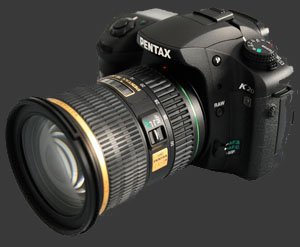
The Pentax K20D also stands-out by having all of the following advanced features, several of them being unique to this digital SLR camera, with the exception of the K10D.
- Shake-reduction, provides stabilization to all lenses at no additional cost.
- Dust-reduction, diminishes the necessity of cleaning the image sensor.
- Weather-seals, enables photography in adverse weather. Usable in rain and snow.
- Auto-ISO with selectable minimum and maximum.
- Unique hyper-program, sensitivity-priority, hyper-manual and shutter-aperture-priority modes
- Direct ISO control in sensitivity-priority mode and optionally in aperture-priority and shutter-priority modes.
- Dual-control wheels, for efficient parameter selection and navigation.
- Multi-exposure photography mode.
- In-camera RAW image conversions.
- Selectable DNG or proprietary RAW file format.
- Support for huge selection of legacy Pentax lenses.
- Illuminated top status panel.
- 20 FPS bust-mode at 1.5 megapixels and focus fine-tuning. New to the K20D.
Pentax K20D Suitability - What is it good for?
Since DSLR cameras represent the high-end of digital cameras, they are generally suitable for most types of photography. The versatility of interchangeable lenses brings SLR cameras their greatest potential. The Pentax K20D is no exception, it is suitable for every type of photographic subject.
Feature-wise, a few DSLR cameras are better suited for action-photography. Even though the K20D can shoot at 3 FPS, some cameras can shoot faster. Specifically, the 10 megapixels Canon EOS 40D and the 12 megapixels Nikon D300 both shoot continuously at 6 FPS or more.
For specific photographic subjects, lens versatility is quite important. While the Pentax K20D supports an incredibly large collection of lenses, most of these lenses are no longer in production. In terms of modern lenses, Pentax offers a rather small lineup, certainly smaller than the lineups of Canon and Nikon. Alternate lenses with common focal-lengths are available from third-party manufacturers such as Sigma and Tokina.
The Pentax K20D has a weather-sealed body that makes it more suitable for rough environments. Conversely, its bulk is more noticeable and less discrete. This is somewhat disadvantageous for street and candid photography. The K20D weights in at 800g, including the battery but no lens. For reference, the smallest DSLR weighs in at 440g. That would be the Olympus E-420, which is a much more discrete camera. It is worth noting that the lens used can significantly contribute to a camera's bulk, particularly when using high-quality lenses with a wide maximum aperture.
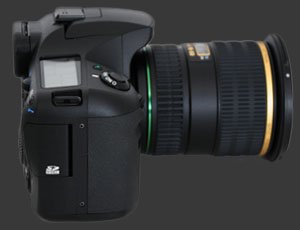
Pentax K20D Capability - What can it do?
As noted in the introduction, the Pentax K20D has everything expected from a DSLR plus an impressive amount of extra features. Headline features include built-in stabilization a dust-reduction mechanism, a rain-worthy weather-proof body, 3 FPS continuous drive, live-view and selectable RAW image formats, either Pentax's PEF or Adobe's DNG. Built-in stabilization is not only a cost-saving feature, it also works with all lenses, even those without any stabilized counterparts such as prime, bright, tilt-shift and fish-eye lenses. Note that the K20D has a buffer limit of 38 JPEG images, while the K10D can shoot at 3 FPS until the memory card filled up.
The Pentax K20D's power-switch has 3 positions: off, on and preview. The preview position is used for depth-of-field preview, digital preview and live-view. In all shooting modes, the behavior of the preview button is controlled by a setup option. Depth-of-field preview simply stops down the lens aperture to the one metered or set manually, this is the usual behavior. Digital preview takes a picture and displays it on the LCD before optionally storing it. The digital preview is also used when setting white-balance. This is an innovative way to ensure that the proper white-balance is selected. While scrolling through white-balance options and fine-tuning white-balance, the preview image is updated accordingly. On every DSLR without this feature, finding the right preset white-balance and tweaking it is more time-consuming.
Live-view is new to the Pentax K20D, probably to satisfy consumer expectation more than anything else. The live-view mode is by far the most pointless one we have seen to date. This mode of the K20D shows focus, framing and white-balance but not exposure or any information such as aperture, shutter-speed, ISO or a live-histogram. No parameters can be changed during live-view either. That includes changing aperture, shutter-speed, ISO or exposure-compensation. Basically, we would call this mode Digital Focus Check, rather than live-view.
The shutter-release on this DSLR is a standard 2-stage release with a distinct halfway point. By default, pressing the shutter-release halfway locks focus but not exposure. Exposure can be locked using a dedicated AEL-button or by pressing the shutter-release halfway when a custom option is set. Focus can also be locked by a separate AF-button which can be configured to disable auto-focus instead. When exposure is locked, whether using the AEL-button or half-pressing the shutter-release, an asterisk is displayed in the viewfinder. This is an important indication of which behavior is in effect.
The mode dial of the Pentax K20D has 10 positions. Five of these modes are ubiquitous on modern DSLR cameras: automatic (called Green-mode), program (P), shutter-priority (Tv), aperture-priority (Av) and full manual (M) mode. Notably absent from the mode-dial are scene modes which frequently control the camera in mysterious ways.
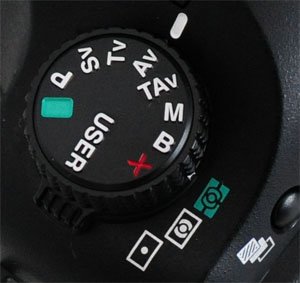
The remaining 5 modes are: sensitivity-priority (Sv), shutter-aperture-priority (TAv), bulb (B), flash-sync (X) and user (USER). Sensitivity-priority is unique to the recent Pentax DSLRs, it lets the user directly select the ISO sensitivity. Shutter-aperture-priority complements sensitivity-priority by letting the user select both shutter-speed and aperture, letting the camera select the ISO sensitivity. Bulb mode keeps the shutter open as long as the shutter-release is pressed, other DSLRs make it part of manual (M) mode. Flash-sync mode keeps the shutter-speed at 1/180 which is the flash-sync speed. User mode is basically any mode which the user can save along with most camera settings. Surrounding the mode-dial is the metering selection switch. The standard 3 metering modes are available: 16-segment metering, center-weighed metering and spot-metering.
The Pentax K20D has detailed control over white-balance including automatic white-balance, preset white-balanceDaylight, shade, cloudy, tungsten, flash and 3-types of fluorescent., manual white-balance and color-temperature. All white-balance options can be fine-tuned in 15-steps from blue to amber and magenta to green. White-balance fine-tuning can be reset by simply pressing the green button from the preview screen.
Exposure compensation can be adjusted in 1/2 or 1/3 EV increments using the exposure compensation button combined with a control-wheel. When the increments are set to 1/2, the range is -3 to +3 EV. Otherwise, the range is -2 to +2 EV. The Pentax K20D can bracket exposure for 3 or 5 frames, with increments between 1/3 and 2 EV. It also supports extended bracketing which produces 3 images from one image capture. Images can vary in saturation, sharpness, contrast, white-balance or hue. Flash compensation can be adjusted between -2 and +1 EV using the function menu.
This DSLR supports the standard drive modesSingle, continuous, self-timer, remote-control. and multiple exposure. In continuous drive mode, the Pentax can shoot up to 38 JPEG images or up to 16 RAW images. Continuous shooting speed is always around 3 FPS. The self-timer can trigger after 2 or 12 seconds. With the 2-second self-timer, the mirror is automatically locked-up. Unfortunately, the 12-second self-timer does not reset after each use. This would avoid the common mistake of forgetting to reset the long self-timer. This is so simple that Pentax could correct it by using a firmware update. Multiple-exposure can combine between 2 and 9 images with or without automatic exposure adjustment.
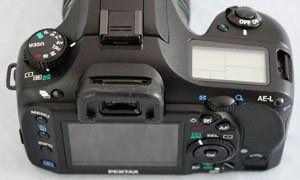
Every DSLR can produce both RAW and JPEG images but the Pentax K20D adds two extra features to its RAW support. The first feature is a choice of format, either Pentax's PEF or Adobe's DNG. The main difference is that PEF is more precisely suited to the K10D while DNG is more portable. The second feature is in-camera RAW development. This feature allows to use RAW images without spending time using conversion software. The difference between capturing JPEG images and processing RAW-images in-camera is that white-balance, image parameters and sensitivity can be adjusted after capture. To aid experimentation with RAW images, the K10D also has a dedicated button to take the next shot in RAW+JPEG mode.
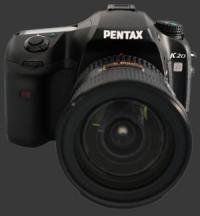 |
Please Support Neocamera
All information on Neocamera is provided free of charge yet running this website is a huge endeavor. Purchases made via affiliate links found throughout the site help keep it running and up-to-date. There is no additional cost to you, so please consider buying via these links to our affilates:
If you found any information on this site valuable and did not purchase via our affiliate links, please considering donating via PayPal:
Any amount will be greatly appreaciated. Thank you for your support!
Pentax K20D Highlights

Sensor-Size: 24 x 16mm

Actual size when viewed at 100 DPI
| 15 Megapixels DSLR | ISO 100-6400 |
| Pentax K Mount 1.5X FLM | Shutter 1/4000-30s |
| 2-Axis Built-in Stabilization | Full manual controls, including Manual Focus |
| 95% Coverage Large Viewfinder | Custom white-balance with 2 axis fine-tuning |
| Weatherproof | Spot-Metering |
| Built-in Dust Reduction | Hot-Shoe & Sync-Port |
| 3 FPS Drive, 38 Images | Lithium-Ion Battery |
| 2.7" LCD 230K Pixels | Secure Digital High Capacity |
Updates
2025.01.18

Fujifilm GFX 2025 Lens Roundup
Lens Review roundup of Fujifilm GFX Medium-Format lenses. Quality, performance and handling of the GF20-35mm F/4R WR, GF30mm F/3.5 Tilt-Shift and the GF55mm F/1.7.
2024.11.18

Best 2024 Photography Gifts for Every Budget
Great gifts for photographers and photo enthusiasts selected for every budget among the best products of 2024.
2024.08.07

Eye Protection Tips for Professional Photographers
The four main considerations for professional photographers regarding eyewear.
2024.07.14

Fujifilm X100VI Review
Flagship fixed-lens compact digital camera with a 40 MP sensor and Image-Stabilization, a first for the series. Retro design featuring dual control-dials, plus direct ISO, Shutter-Speed and EC dials. Its hybrid viewfinder can switch between EVF and OVF mode.
2024.05.09

Fujifilm GFX100 II Review
Flagship 102 Megapixels Medium-Format Mirrorless Digital Camera with 8-Stop 5-Axis IBIS, 8 FPS Drive, 8K Video and 400 MP Super-Resolution capture in a weatherproof and freezeproof body with dual control-dials and dual memory-card slots.
2024.04.03

Fujifilm X-T5 Review
Newest Fujifilm flagship boasting a 40 MP APS-C sensor, 5-axis IBIS with 7-stop efficiency, 15 FPS continuous drive, 6.2K Video capture, dual control-dials and dual SDXC UHS-II slots in a sturdy weatherproof and freezeproof body.
2023.11.20

Best Digital Cameras of 2023
Find out which are the Best Digital Cameras of 2023. All the new Mirrorless Digital Cameras from entry-level to high-end professional.
2023.07.10

Fujifilm X-H2 Review
40 Megapixels APS-C Hybrid Mirrorless Digital Camera with 7-stop IBIS. Fastest shutter ever and 8K video capture. Large builtin EVF with 0.8X magnification and 5.8 MP, plus an Eye-Start Sensor. Packed with features and large number of controls in a weatherproof and freezeproof body.
2023.05.07

Sony FE 20-70mm F/4G Review
Review of the unique Sony FE 20-70mm F/4G lens. The optical zoom of this lens spans ultra-wide-angle and medium focal-length coverage, making it one of the most versatile Full-Frame lenses on the market.
2023.01.15

Huion Inspiroy Dial 2 Review
Review of the Huion Inspiroy Dial 2 tablet, a medium sized drawing surface with dual dials and customizable buttons. Connects via USB-C or Bluetooth 5.0 with Windows, Linux and Android support.
2022.12.08

How to Pack for a Photo Trip
Find out how to pack for a travel photography trip, carry your gear safely while meeting airline regulations.
2022.11.13

Best Digital Cameras of 2022
The best digital cameras of 2022. A short list of the most outstanding models in their respective categories. Choose one for yourself or as a gift.










